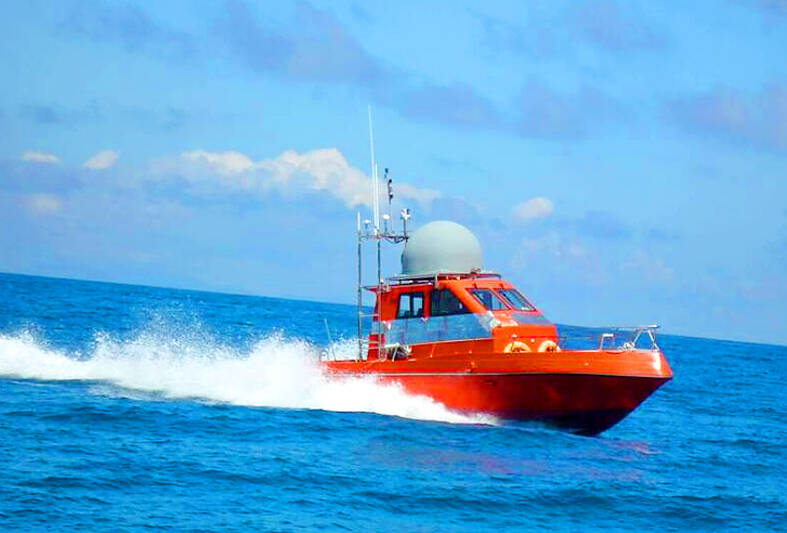Taiwan could begin mass production of maritime drones — an uncrewed surface vessel that resembles a speedboat — in 2026 if the craft developed by the Chungshan Institute of Science and Technology pass military tests, senior government officials said.
The government began developing applications of uncrewed vehicles after Ukraine used craft that can be remotely controlled to destroy Russian vessels.
The use of maritime drones makes it possible for the military to launch unexpected attacks in wartime and reduce personnel casualties, which can deter enemies, senior government officials said, adding that Taiwan has the ability to integrate uncrewed vehicles in the air, on land and under water to enhance its capabilities in reconnaissance, attacks and removing mines.

Photo: Screen grab from the institute’s Web site
The institute has recently updated the information on its Web site to say that an uncrewed target craft has been developed and used.
The target craft system is an uncrewed maritime vehicle that has remote control, preplanned routes and real-time video transmission, the institute said, adding that the craft’s functions include radio frequency simulators, radio frequency interference simulation systems, heaters, flame launchers and radar signal reflectors.
“The system has the ability to simulate radio frequency signals, interference signals, thermal radiation signals, and to scan cross-sectional areas of maritime targets. Multiple sets of target craft systems and project training courses would be combined in the military training to simulate various scenarios and effectively measure the weapon performance,” the institute said.
Radar, weapons, sonar and other modules in the target craft system can also be expanded to perform near-shore defense, attack, mine detection, submarine detection and other tasks, it said.
To counter China’s military threat, the institute has planned to invest NT$812 million (US$25.14 million) in building two uncrewed attack craft with different sizes and bomb loads, military sources said.
The remote guidance and control distance of the two uncrewed attack craft would be increased from 60km to 70km, they said.
Other sources said that attack drones built by the institute are already in mass production.
If the attack craft pass military combat tests, mass production should begin in 2026, they said, adding that the development and evaluation of uncrewed attack-type underwater vehicles are in progress.
In other developments, as the one-year compulsory conscription system is to be reimposed in January next year, the military has stepped up the production of personal combat equipment and individual weapon systems.
Taiwan’s army has purchased more than 100,000 Kestrel rocket launchers from the institute, military sources said.
Voluntary and compulsory service officers and soldiers serving in the anti-armor company of the ground forces and related units would get to experience using actual Kestrel rocket launchers to strengthen the nation’s anti-armor combat capability, they said.
Kestrel rockets are anti-armor individual rockets developed by the institute and adopt a disposable launch tube design that can reduce the burden on officers and soldiers. The rocket system costs about NT$100,000 per unit as massive production has driven down production costs. The rockets also have optical targeting and night vision functions to meet combat needs. Officers and soldiers can use anti-armor rockets or attack rockets, depending on the mission. Their maximum shooting range is 1,200m and the effective range is 400m. The attack rockets can penetrate a 30cm-thick brick wall.

The CIA has a message for Chinese government officials worried about their place in Chinese President Xi Jinping’s (習近平) government: Come work with us. The agency released two Mandarin-language videos on social media on Thursday inviting disgruntled officials to contact the CIA. The recruitment videos posted on YouTube and X racked up more than 5 million views combined in their first day. The outreach comes as CIA Director John Ratcliffe has vowed to boost the agency’s use of intelligence from human sources and its focus on China, which has recently targeted US officials with its own espionage operations. The videos are “aimed at

STEADFAST FRIEND: The bills encourage increased Taiwan-US engagement and address China’s distortion of UN Resolution 2758 to isolate Taiwan internationally The Presidential Office yesterday thanked the US House of Representatives for unanimously passing two Taiwan-related bills highlighting its solid support for Taiwan’s democracy and global participation, and for deepening bilateral relations. One of the bills, the Taiwan Assurance Implementation Act, requires the US Department of State to periodically review its guidelines for engagement with Taiwan, and report to the US Congress on the guidelines and plans to lift self-imposed limitations on US-Taiwan engagement. The other bill is the Taiwan International Solidarity Act, which clarifies that UN Resolution 2758 does not address the issue of the representation of Taiwan or its people in

US Indo-Pacific Commander Admiral Samuel Paparo on Friday expressed concern over the rate at which China is diversifying its military exercises, the Financial Times (FT) reported on Saturday. “The rates of change on the depth and breadth of their exercises is the one non-linear effect that I’ve seen in the last year that wakes me up at night or keeps me up at night,” Paparo was quoted by FT as saying while attending the annual Sedona Forum at the McCain Institute in Arizona. Paparo also expressed concern over the speed with which China was expanding its military. While the US

SHIFT: Taiwan’s better-than-expected first-quarter GDP and signs of weakness in the US have driven global capital back to emerging markets, the central bank head said The central bank yesterday blamed market speculation for the steep rise in the local currency, and urged exporters and financial institutions to stay calm and stop panic sell-offs to avoid hurting their own profitability. The nation’s top monetary policymaker said that it would step in, if necessary, to maintain order and stability in the foreign exchange market. The remarks came as the NT dollar yesterday closed up NT$0.919 to NT$30.145 against the US dollar in Taipei trading, after rising as high as NT$29.59 in intraday trading. The local currency has surged 5.85 percent against the greenback over the past two sessions, central